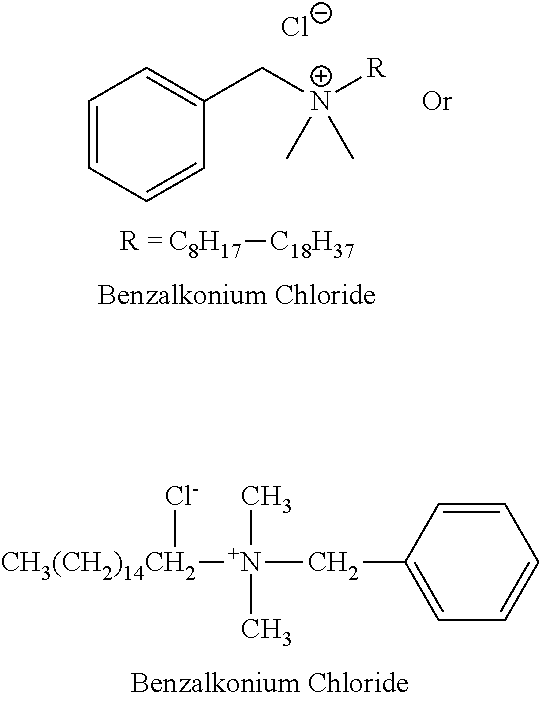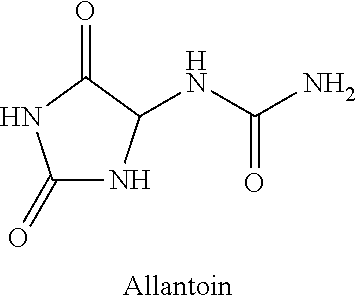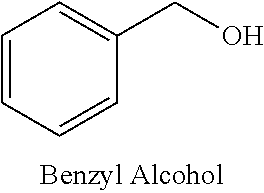Treatment of Herpes, Pseudomonas, Staph, and Hepatitis
a technology of pseudomonas and hepatitis, applied in the field of medicinal treatment, can solve the problems of skin redness and inflammation around the blisters, recurrence of cold sores etc., and achieve the effects of safe, economical and effective treatment, and relief of cold sores, rashes, skin conditions or symptoms
- Summary
- Abstract
- Description
- Claims
- Application Information
AI Technical Summary
Benefits of technology
Problems solved by technology
Method used
Image
Examples
examples 1-7
In Vivo Testing
[0227]In an initial, topical application, in-vivo study that was undertaken to evaluate the effects of the medical treatment and medicine of the present invention upon seven human test subjects who had been tested positive for HSV 1 or 2. The subjects were treated topically with the medicine comprising benzalkonium chloride surfactant in an aqueous solution (at a ratio of 1:750) in combination with the herbaceous botanical Echinacea purpurea in powdered form containing the previously listed phytochemicals. Application of the composition was made by a two-step procedure by first wetting the affected area or vesicle with the benzalkonium chloride surfactant in an aqueous solution by spraying, dabbing, or using a dropper; then applying a coating of the powdered phytochemicals over the wetted area by either swab or manually sprinkling the powder onto the infected area. An important aspect in this treatment was maintaining complete coverage of the affected area for the dur...
examples 8-13
Dermatological and Veterinary Testing
[0237]Animal testing to determine any possible dermatological allergic reaction induced by the medical composition (medicine) was undertaken. Six animal subjects were used. The animals included 3 female rabbits (ages unknown); 2 dogs (1 female 2 year old, and 1 male 9 year old); one, 3 year old neutered male cat. In these animal tests, the above composition (medicine) was applied, in the previously stated method, to the inside of the outer ear of each animal. In all instances, the area being treated was kept coated with the compound for twenty-four hours, matching the time human subjects had used. The testing performed on the six animal subjects indicated that there were no signs of dermatological irritation or allergic reaction.
example 14
[0238]The above medical compound containing viral inhibitors was also tested on a papilloma virus caused wart on the muzzle of a two year old gelded thoroughbred horse. Papilloma virus warts are difficult to treat. The wart measured 25 mm in diameter. The antimicrobial compound (medicine) was applied twice daily. The wart was then measured at each application.
[0239]Results:
[0240]Quite unexpectedly, the wart decreased dramatically in size by approximately 3 mm per day while the medicine was applied to the wart and on the fifth day fell off completely. It was observed that, at first the surface layers of the wart began to degrade, exposing large erythematous papules. Then interestingly, the warts did not just diminish in size by flaking or peeling, they diminished at the point of attachment on the subject's epidermis and fell off still somewhat intact with no sequela scarring.
[0241]In an ongoing, long term in vivo study of this invention, which began with the first seven subjects in A...
PUM
| Property | Measurement | Unit |
|---|---|---|
| median time | aaaaa | aaaaa |
| time | aaaaa | aaaaa |
| time | aaaaa | aaaaa |
Abstract
Description
Claims
Application Information
 Login to View More
Login to View More - R&D
- Intellectual Property
- Life Sciences
- Materials
- Tech Scout
- Unparalleled Data Quality
- Higher Quality Content
- 60% Fewer Hallucinations
Browse by: Latest US Patents, China's latest patents, Technical Efficacy Thesaurus, Application Domain, Technology Topic, Popular Technical Reports.
© 2025 PatSnap. All rights reserved.Legal|Privacy policy|Modern Slavery Act Transparency Statement|Sitemap|About US| Contact US: help@patsnap.com



